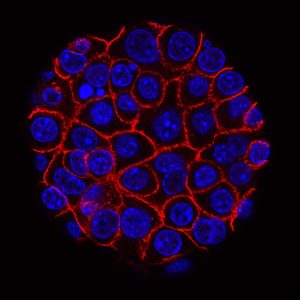
AstraZeneca lung drug shines on
pharmafile | June 1, 2015 | News story | Sales and Marketing | ASCO, AZD9291, AstraZeneca, MEDI4736, NSCLC, Tafinlar
AstraZeneca’s investigational drug AZD9291 is continuing to impress, with results announced at cancer conference ASCO building on its previous ‘unprecedented’ survival figures.
Its Phase I AURA study tested the medicine in EGFRm positive advanced non-small cell lung cancer (NSCLC). Eighty-one per cent of patients were progression-free at nine months, and the overall response rate was 73 per cent.
Antoine Yver, AstraZeneca’s head of oncology global medicines development, says: “The promising response to first-line treatment with AZD9291 builds on the encouraging efficacy already seen in patients with EGFRm advanced NSCLC who have the T790M resistance mutation.”
Trial results published in April suggested that the drug could increase progression-free survival to an ‘unprecedented’ 13.5 months in patients with this mutation, which can cause resistance to standard treatments.
“We remain confident that AZD9291 has the potential to deliver early and durable efficacy by targeting both activating and resistance EGFR mutations,” adds Yver.
AZD9291 is also being tested in combination with anti PD-L1 immunotherapy MEDI4736 for lung cancer in the TATTON study. Results from this study presented at ASCO showed that it has a tolerable safety profile that facilitates its use in the combination.
MEDI4736 had a strong showing at ASCO itself, with data demonstrating clinical activity in a range of tumour types.
A trial testing the drug in combination with tremelimumab, a CTLA-4 inhibitor, showed an overall response rate of 27% in the treatment of NSCLC, while another in melanoma showed partial response rates in 69% of patients receiving MEDI4736 with Novartis’ Tafinlar (dabrafenib) and Mekinist (trametinib).
Last month AZ also announced a deal to test the medicine in combination with Lilly’s Cyramza (ramucirumab).
In a May media briefing Steve Olsen, AZ’s head of global oncology affairs, stressed the importance of such combinations to the company.
“We know that this works with chemotherapy, that poly-chemotherapy for a lot of diseases is better than single agent chemotherapy. With targeted therapies, we believe it’s the same – and especially by combining things such as drugs that rev-up the immune system with drugs that are targeting the pathways that drive cancer cells to grow.
“We believe that putting these together puts AstraZeneca in a really unique position, because not a lot of companies have the rich pipeline we have, they don’t have the breadth of the types of molecules that we have.”
George Underwood
Related Content

AstraZeneca shares results for Imfinzi in phase 3 trial for small cell lung cancer
AstraZeneca has announced positive high-level results from the phase 3 ADRIATIC trial, which demonstrated that …

FDA accepts BLA for AstraZeneca and Daiichi Sankyo’s datopotamab deruxtecan for breast cancer treatment
AstraZeneca and Daiichi Sankyo have announced that their Biologics License Application (BLA) for datopotamab deruxtecan …

FDA approves AstraZeneca’s Ultomiris for NMOSD treatment
AstraZeneca has announced that the US Food and Drug Administration (FDA) has approved Ultomiris (ravulizumab-cwvs) …








